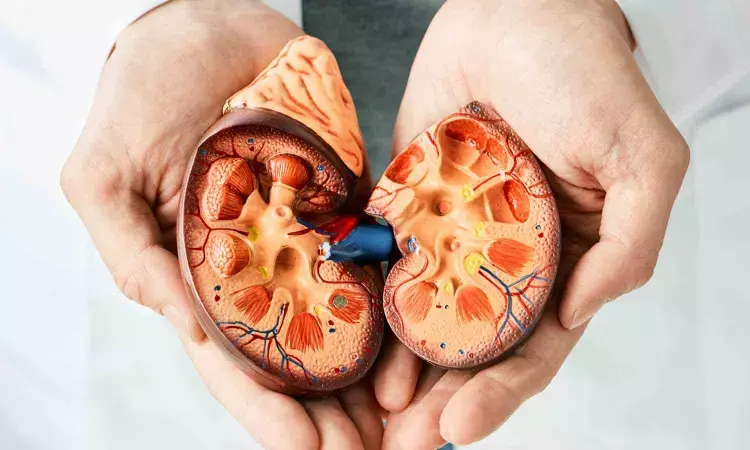- Home
- Medical news & Guidelines
- Anesthesiology
- Cardiology and CTVS
- Critical Care
- Dentistry
- Dermatology
- Diabetes and Endocrinology
- ENT
- Gastroenterology
- Medicine
- Nephrology
- Neurology
- Obstretics-Gynaecology
- Oncology
- Ophthalmology
- Orthopaedics
- Pediatrics-Neonatology
- Psychiatry
- Pulmonology
- Radiology
- Surgery
- Urology
- Laboratory Medicine
- Diet
- Nursing
- Paramedical
- Physiotherapy
- Health news
- Fact Check
- Bone Health Fact Check
- Brain Health Fact Check
- Cancer Related Fact Check
- Child Care Fact Check
- Dental and oral health fact check
- Diabetes and metabolic health fact check
- Diet and Nutrition Fact Check
- Eye and ENT Care Fact Check
- Fitness fact check
- Gut health fact check
- Heart health fact check
- Kidney health fact check
- Medical education fact check
- Men's health fact check
- Respiratory fact check
- Skin and hair care fact check
- Vaccine and Immunization fact check
- Women's health fact check
- AYUSH
- State News
- Andaman and Nicobar Islands
- Andhra Pradesh
- Arunachal Pradesh
- Assam
- Bihar
- Chandigarh
- Chattisgarh
- Dadra and Nagar Haveli
- Daman and Diu
- Delhi
- Goa
- Gujarat
- Haryana
- Himachal Pradesh
- Jammu & Kashmir
- Jharkhand
- Karnataka
- Kerala
- Ladakh
- Lakshadweep
- Madhya Pradesh
- Maharashtra
- Manipur
- Meghalaya
- Mizoram
- Nagaland
- Odisha
- Puducherry
- Punjab
- Rajasthan
- Sikkim
- Tamil Nadu
- Telangana
- Tripura
- Uttar Pradesh
- Uttrakhand
- West Bengal
- Medical Education
- Industry
ACCI value over 3 may predict risk of complications among kidney transplant patients: Study

A new study published in the journal of BMC Nephrology shows that kidney transplant (KT) patients were at risk for postoperative problems if their preoperative age-adjusted Charlson Comorbidity Index (ACCI) value was more than 3.
The best course of treatment for end-stage renal disease (ESRD) is seen to be kidney transplantation. Kidney transplantation considerably increases life expectancy and improves quality of life when compared to long-term dialysis. But it is important to be mindful of any problems that might harm people. A worse quality of life, a higher risk of a brief postoperative readmission, higher medical costs, and even potentially fatal circumstances might result from these problems.
Graft failure, cardiovascular complications (heart failure, cardiac arrest, arrhythmias), infectious complications (pulmonary infections, urinary tract infections), urological complications (ureteral stenosis), and neurological complications (cerebrovascular disease, peripheral neuropathy) are some of the most common post-operative complications of kidney transplantation.
One well-known and often-used instrument for assessing comorbidities in clinical research is the Charlson Comorbidity Index (CCI). In patients with end-stage renal illness receiving dialysis and kidney transplantation, the Charlson Comorbidity Index has demonstrated prognostic significance for both short-term and long-term outcomes. Studies have linked early fracture-related morbidity in femur fractures treated with cervical fixation to high CCI scores. This study was set out to evaluate the relationship between the postoperative problems kidney transplant patients and the ACCI.
This research with 886 kidney transplant patients was carried out at the Third Affiliated Hospital of Sun Yat-sen University from January 2015 to March 2021. The Clavien-Dindo Classification of Surgical Complications was used to characterize postoperative complications. To evaluate the relationship between ACCI and postoperative problems, Target Maximum Likelihood Estimation (TMLE) was utilized. To ascertain the association between ACCI and postoperative complications, the odds ratio (OR) was calculated. Stratified and subsequent interaction analyses were conducted to evaluate the findings' robustness.
Postoperative problems were reported in 30.7% of the 859 KT patients who were eventually included in the research. After multivariable correction, those with an ACCI score greater than 3 showed a noticeably higher risk of postoperative problems. The 3 preoperative comorbidities most strongly associated with postoperative problems in ACCI were peripheral vascular disease, congestive heart failure, and chronic obstructive pulmonary disease.
Overall, one possible risk factor for postoperative problems in kidney transplant recipients is having a preoperative ACCI score higher than 3. This can help to proactively identify high-risk patients who are likely to have postoperative difficulties after kidney transplant surgery by using the ACCI score.
Reference:
Huang, Q., Luo, T., Yang, J., Lu, Y., Zhou, S., Hei, Z., & Chen, C. (2024). Association between the age-adjusted Charlson Comorbidity Index and complications after kidney transplantation: a retrospective observational cohort study. In BMC Nephrology (Vol. 25, Issue 1). Springer Science and Business Media LLC. https://doi.org/10.1186/s12882-024-03888-1
Neuroscience Masters graduate
Jacinthlyn Sylvia, a Neuroscience Master's graduate from Chennai has worked extensively in deciphering the neurobiology of cognition and motor control in aging. She also has spread-out exposure to Neurosurgery from her Bachelor’s. She is currently involved in active Neuro-Oncology research. She is an upcoming neuroscientist with a fiery passion for writing. Her news cover at Medical Dialogues feature recent discoveries and updates from the healthcare and biomedical research fields. She can be reached at editorial@medicaldialogues.in
Dr Kamal Kant Kohli-MBBS, DTCD- a chest specialist with more than 30 years of practice and a flair for writing clinical articles, Dr Kamal Kant Kohli joined Medical Dialogues as a Chief Editor of Medical News. Besides writing articles, as an editor, he proofreads and verifies all the medical content published on Medical Dialogues including those coming from journals, studies,medical conferences,guidelines etc. Email: drkohli@medicaldialogues.in. Contact no. 011-43720751


